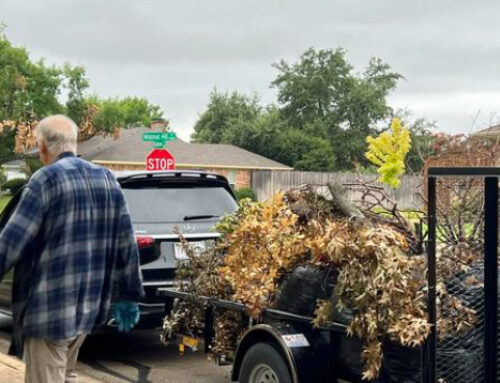Volunteering – nearly all of us have done it at one time or another.
We go to the schools that our children attend. We help out with projects at church. Some of us do it out of a sense of guilt or duty. No matter the motivation, there’s no doubt that, without volunteers and their dedication, many schools and non-profits in Dallas and other cities could not survive.
But then there’s a different kind of volunteer. Those who, day after day, continue to give of their time long after the so-called reason for doing so has ceased to exist. The same ones do it not out of duty alone, but because they enjoy it. Because, if they didn’t do it, they say, their lives would be less rich, less rewarding.
People such as Lake Highlands residents Kevin Fagan and Steve Swayze, who nearly every weekday for more than a decade have gone to Northlake Elementary School. Once there, they head to the cafeteria to tutor first-through sixth-graders, kids who otherwise might fall through the cracks, in math.
What’s astounding about Fagan and Swayze is that their own children are long since grown, out of school. And they don’t tutor at the school once a week, or a couple times a month – they go every day, Monday through Friday, waking long before 7 a.m. to do so.
Why?
“It keeps us young.”
“We feel it does some good.”
“We really enjoy it.”
All are true, but what it really boils down to is this:
“You live by example – my father used to always tell me that. And it’s not escaped me. I tell my kids the same thing,” Fagan says. “If you’ve got talent, you’re expected to utilize your talent in the community in a good way, and we all have talent.
“You should stop and turn around to the next generation that comes along – not just your own kids – and give of yourself, of that talent. Those kids are your future.”
Fagan and Swayze started going to Northlake in the early ’90s. Neither can remember exactly what year. A principal at the time told Fagan they could use help, and before long, he’d recruited Swayze.
Together, they’ve been able to keep the program going by making learning fun, teaching math through games such as dominoes and cards, and promoting competition. When kids succeed, they provide them with both material and emotional rewards: pencils with their names on them, names read over the loudspeaker, a list of those who have conquered their multiplication tables printed up on a poster.
Their years of hard work have paid off. 2002 TAAS test results show that Northlake students score higher in math – with 95.6 percent passing – than in reading or writing.
“I’m impressed with their dedication and patience with the children, and their willingness to come rain or shine all the time,” says Wanda Watkins, the school’s principal. “To give of their time, when we don’t pay them or give them any return, is just really wonderful. We feel really blessed to have them.”
The two men, however, would argue they do get some kind of return. For them, the rewards are purely emotional, particularly when they reach a child who, as Fagan puts it, doesn’t necessarily have “the background for success.”
More than 80 percent of children attending Northlake are black or Hispanic, and many live in apartment communities. In many instances, students come from low-income, single-parent households, where the parent has to work and can’t be as involved as he or she would like to be, so the child slips behind. Other times, the situation at home is much worse, Swayze laments.
“Here you’ve got an angry girl who would just as soon cuss at you as she looks at you in the face,” he says. “Well, her mother’s on drugs and has 14 boyfriends. You’d be angry, too. We’ve gradually learned not to get upset that some of them are angry.”
The rewards come when they pierce through the anger.
“All the sudden, they begin to understand what’s happening,” Fagan says. “It gives these kids a little bit of a leg up. Our goal is to give them the confidence so that, when they head to class, they feel good about themselves.”
And neither man will deny that feeling good is one of the reasons they continue to do this long after their own children have moved out.
“What people don’t understand is we get a lot more benefit out of it than anybody else does,” Swayze says. “I know a lot of wealthy people, and I know a lot of people that are not so wealthy. And some of them are just suffering from pure loneliness, or they’re busy worrying about their job. I want to say: Just go volunteer at the hospital, the library, go down to the elementary school. It is so much fun. I can’t have more fun than dealing with all these kids.”
Fagan agrees, adding: “There’s an awful lot of children who need individual attention, and 10 minutes of that is the best investment you’ll ever have. It goes a heck of a long way. They see there’s hope, and they see that somebody cares.
“And if somebody cares enough,” he says, it doesn’t matter what their background is.
“They will give their very best.”





